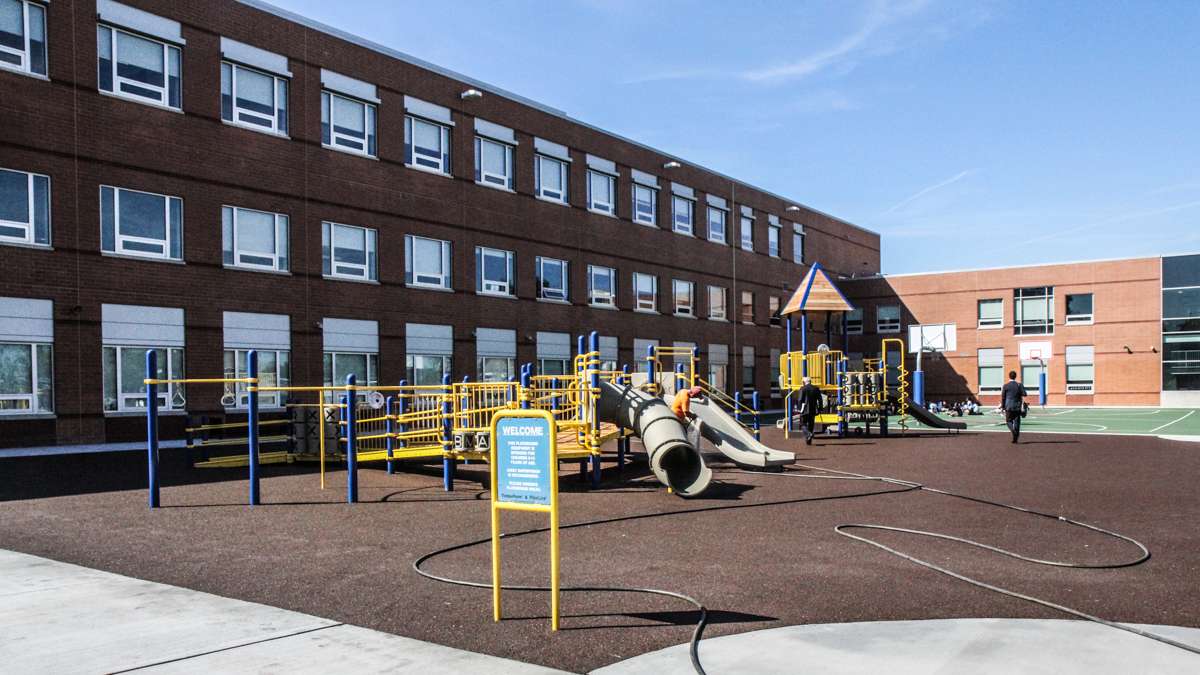‘Renaissance schools’ have little to do with people of Camden

The recess yard at Kipp Cooper Norcross Academy in Camden. (Kimberly Paynter/WHYY)
Too often the issue of “renaissance schools,” local control, and public education in Camden is presented as exclusively an education issue. It isn’t. The educational decisions in Camden have everything to do with land and the city’s redevelopment.
Too often the issue of “renaissance schools,” local control, and public education in Camden is presented as exclusively an education issue.
It isn’t. The educational decisions in Camden have everything to do with land and the city’s redevelopment. Camden County Democrats, including the 5th Legislative District, the entirety of Camden’s City Council, and the mayor under the guidance of Norcross Inc. and Gov. Chris Christie, have concluded that “middle-class” people will not move to, or reside in, Camden because of safety concerns and “failing” public schools.
To address concerns relating to Camden violence, the solution of dismantling the city police force and starting a new county police force (which only patrols Camden) was the course of action taken in 2013.
Today, the CCPD is having trouble recruiting and retaining both new and experienced officers — who incidentally, bear little resemblance to the community they serve.
And as Camden’s arsons, drug overdoses, and bodies unfortunately continue to pile up, it is obvious the window dressing measure behind the shift to a county police force has not changed the realities on the ground. But what was more important to city and county politicians were the headlines they garnered; the illusion of a safer Camden — and that they achieved.
The push for “renaissance” charter schools is motivated by the same desire to capture headlines, and put forth the image that education in Camden is “improved.”
This narrative’s audience is not intended to be Camden parents with school-age children, but middle-class, college-educated millennial and hipsters who think cities are “cool” but also think starting and raising a family in Camden is not feasible because of concerns over public school quality.
With “renaissance schools,” the facade that education in Camden is “better” or “improved” is set, and pols hope it is enough to attract people who ordinarily are scared off by sending their children to public schools attended by low-income, minority children.
The KIPP-Cooper-Norcross Renaissance School, adjacent to the new Rowan Medical School, is a model for what politicians want “renaissance schools” to achieve in Camden’s redevelopment. Housing and rental prices surrounding the school are soaring to exclusionary rates nearing $2,000 per month — far higher than they were just five years ago.
This is no aberration; this is the plan. “Willing to Pay: Charter Schools’ Impact on Georgia Property Values,” published by Georgia State University, showed that middle-class homeowners are willing to pay higher prices to live near what they consider to be high-quality charter schools. Not unique to Georgia, this phenomenon is occurring in cities across the nation and is the new tactic in urban revitalization.
Strip urban schools of their democratic authority, close public schools, simultaneously establish charter schools, reduce availability and access to public housing, attract outside residents, watch housing prices rise out of the range of affordability, and native residents are displaced through higher taxes or rental prices.
The drive behind recent development and the “renaissance schools” in Camden is gentrification. With politicians pushing for their rapid expansion versus public-school parents demonstrating strident resistance, the battle is really a proxy war over who gets to live in Camden in the future.
For Camden residents, whether they are public school parents or charter parents, whether they are middle-aged workers or seniors on fixed incomes with no children in the schools, the consequences behind the existence and expansion of “renaissance schools” will be felt by all — and not for the better.
—
Keith E. Benson is a teacher at Camden High School. He is a doctoral candidate at Rutgers Graduate School of Education.
WHYY is your source for fact-based, in-depth journalism and information. As a nonprofit organization, we rely on financial support from readers like you. Please give today.

